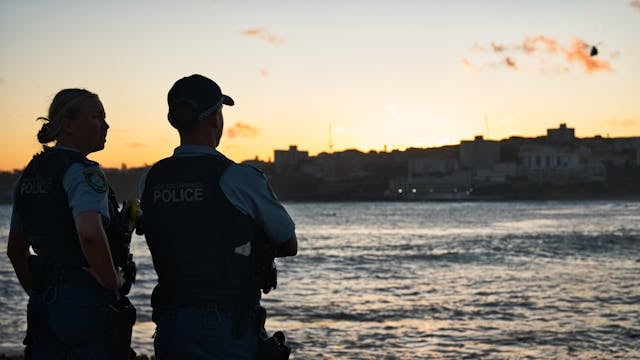
The Australian Federal Police has quietly launched specialised teams with sweeping new powers to monitor and investigate groups they believe are threatening Australia's social harmony.
But what exactly can these officers do, and should everyday Australians be concerned?
The task force with teeth
The National Security Investigation teams began operations in Sydney, Melbourne and Canberra in September, targeting those attempting to damage social cohesion through a four-pronged strategy centred on national coordination, policy development, legislation and police operational actions.
Operating under the AFP's Counter Terrorism and Special Investigations Command, these aren't your regular beat police.
The AFP will utilise its unique capabilities and legislation, including electronic surveillance powers, to facilitate the collection of intelligence related to criminal networks operating online.
This means they can monitor social media, intercept communications, and track digital footprints of people they suspect might be planning activities that could harm social unity.
'There are current and emerging groups who are eroding our country's social fabric by advocating hatred, fear, and humiliation.'
What triggers their attention
Some of these groups have already engaged in vandalism, destruction of property and the targeting of businesses based on race or religion.
While many of these crimes may not meet the threshold of terrorism, the AFP has identified concerning behaviours which could escalate to politically-motivated violence or hate crimes.
The teams are particularly focused on groups that target federal politicians—something that's become increasingly common as political tensions rise across the country.
Recognising these groups plan their acts and radicalise others online, the AFP will work with trusted partners to innovate and adopt new technologies to detect violent extremist material and decode criminal language used in attempts to avoid detection.
Australia's growing social tensions
The timing of this task force isn't coincidental. Australia has experienced rising tensions around several flashpoints in recent years, from pandemic responses to international conflicts that have affected local communities.
Over the past two years, particularly since October 7, 2023, we have witnessed a changing operating environment for law enforcement in Australia. The war in Gaza has sparked protests and counter-protests. At the same time, housing affordability and migration levels continue to fuel public frustration.
Reporting suspicious activity
If you're concerned about potential threats to community safety, contact:
National Security Hotline: 1800 123 400
Emergencies: Triple Zero (000)
Local police for area-specific matters
The divide over root causes
Not everyone agrees that this new police approach addresses the real issues. Nationals Senator Matt Canavan argues that government policies themselves are driving the divisions the AFP is now investigating.
'If the Government truly cared about "social cohesion", it would deliver on its promises,' Canavan said, pointing to migration levels that remain well above the government's promised reductions.
His argument reflects a broader debate: Are these social tensions the result of genuine policy failures around housing, migration, and cost-of-living pressures, or are they being artificially inflamed by extremist groups that exploit legitimate concerns?
Recent polling suggests many Australians share Canavan's concerns about current migration levels, with 60 per cent believing they're too high and 67 per cent saying mass migration is making the country more divided.
The challenge for any democracy is striking a balance between legitimate security concerns and the protection of civil liberties.
Terms such as 'social cohesion' and 'security threats' are deliberately vague. They go far beyond the already vast scope of what is legally classified as 'terrorism,' 'politically-motivated violence' or 'hate speech.'
This broad scope has raised eyebrows among civil liberties advocates who worry about potential overreach.
When police can investigate activities that don't even meet the threshold for terrorism charges, where do we draw the line between legitimate protest and threatening behaviour?
What This Means For You
The taskforce focuses on groups, not individuals expressing legitimate political views.
Electronic surveillance requires judicial oversight and warrants
Peaceful protest and political criticism remain protected rights
Focus is on preventing escalation to violence, not silencing dissent
For most Australians going about their daily lives, these new teams won't directly impact them. The focus is on organised groups engaging in criminal activity or planning violence, rather than on individuals expressing political opinions or participating in peaceful protests.
However, the broad surveillance powers do mean increased monitoring of online spaces. The NSI teams will work closely with state and territory police to provide a nationally coordinated, consistent and intelligence-led response to security threats.
Australia faces a genuine challenge in maintaining social harmony while preserving democratic freedoms.
Rising housing costs, concerns about migration levels, and international conflicts affecting local communities all contribute to social tensions that extremist groups can exploit.
Did you know?
The new NSI teams can use the same electronic surveillance powers typically reserved for terrorism investigations, including monitoring online communications and tracking digital activities of suspected groups.
The success of these new police teams will ultimately depend on whether they can distinguish between legitimate political dissent and genuine threats to community safety. In a democracy, the right to criticise government policies—even harshly—remains fundamental.
What's clear is that Australia's social fabric faces real pressures from multiple directions: economic stress, rapid social change, international conflicts, and groups seeking to exploit these tensions for their own ends.
The question for all Australians is whether expanded police powers are the right tool to address these complex social challenges, or whether the focus should be on addressing the underlying issues that create fertile ground for extremism in the first place.
Have you noticed increased tensions in your community? What do you think is the best way to maintain social harmony while protecting everyone's right to express their views? Share your thoughts with us in the comments below.







